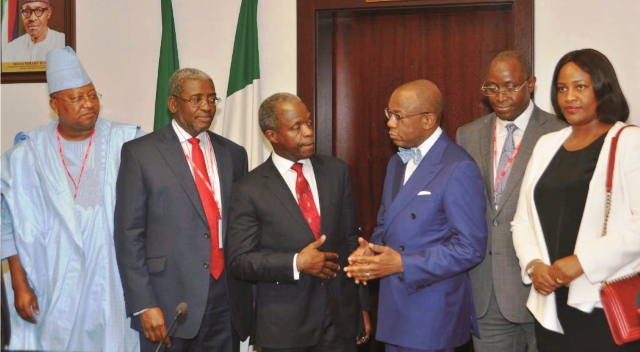Business
Capital Market Favours Domestic Investors – Sec

The Securities and Exchange Commission (SEC) says domestic investors have a higher stake in the Nigerian capital market than their foreign counterparts.
The Director-General of SEC, Mr Mounir Gwarzo, who disclosed this while speaking to newsmen in Abuja on Sunday, said enlightenment programmes were being intensified to bring in more of the retail investors.
“In terms of absolute number, the domestic investors have a higher stake than the foreign investors and we are doing a lot of public enlightenment programmes particularly to bring in the retail investors.
“Our research shows that we have less than two per cent of retail investors in our market.
“Whereas if you look at other jurisdictions – Malaysia has nine per cent, South Africa has 19 per cent, US has 43 per cent and UK has 37 per cent of retail investors
“So, part of the reasons why I am here is to solicit the support of the News Agency of Nigeria in terms of our public enlightenment with respect to e-dividend and other initiatives.
“So that we will be able to bring back the retail investors,’’ Gwarzo said.
The SEC boss said that foreign investors seemed to be dictating the pattern of the market in the country because they were more of portfolio investors, who buy and sell.
“Whereas, the domestic investors – both the institutional investors – are retail, particularly the institutional investors, particularly the pension funds.
“So that is why you see that whenever the foreign investors now either sell or buy, the market reacts.
According to Gwarzo, institutional investors particularly the pension funds have been doing quite well.
He explained that a new guideline would soon be released by PENCOM that would encourage Pension Fund Administrators to invest more in the capital market.
He said, “because they do not have a board that is why those new guidelines have not been released yet.
“So I believe in the next couple of years and with the massive public enlightenment we are making to bring back the retail investors and with the dynamism we are seeing from the PENCOM.
“Particularly to bring in the pension investors, I am sure the dominance of the domestic investors particularly in the areas of portfolio investments will increase.
Gwarzo explained that the recent set back experienced in the capital market was because the regulators and stakeholders failed in their duties.
“The market has largely recovered; the Central Bank of Nigeria, Securities and Exchange Commission and other regulators like the Nigeria Stock Exchange and the operators have learnt from their mistakes.
“It happened because both parties did not do what is right, and like I said, we have learnt our lessons and that is why now things are much better.
“We have put some of the precautionary measures that hopefully, such things would not happen again particularly the magnitude with which the market went down.’’
Gwarzo said investing pension funds in the capital market was ideal, adding that in most countries of the world, the major investors in the capital market were the pension funds.
“When we say that pension funds should come in, we are not saying that they should just go and invest in any kind of security.
“There are lots of stocks in the market that are also quite stable that you can also say probably in the next 100 years those stocks will still be there.
“There are good stocks like Nestle, whose products we use on a daily basis and most of them are now going through backward integration in terms of their sources of raw materials.
“So they are going to be quite sustainable,’’ he said.
Transport
Automated Points Concession : FAAN Workers Gave 72hrs To Revise Decisions In PH

Transport
FAAN Announces Pick-Up Points for Go-Cashless Cards

Business
Fidelity Bank To Empower Women With Sustainable Entrepreneurship Skills, HAP2.0
-
Politics3 days ago
2027: NIGERIANS FAULT INEC ON DIGITAL MEMBERSHIP REGISTER DIRECTIVE
-

 Environment3 days ago
Environment3 days agoLAWMA Director Says Sweeping Reforms Have Improved Waste Collection
-
Politics3 days ago
LP Crisis: Ex-NWC Member Dumps Dumps Abure Faction
-

 Politics3 days ago
Politics3 days agoUmahi Dismisses Allegations On Social Media, Insists On Projects Delivery
-

 Sports3 days ago
Sports3 days agoAbia Not Sure To Secure continental Ticket
-
Politics3 days ago
NATASHA ELECTRIC VEHICLES INITIATIVE IN KOGI CENTRAL
-
Sports3 days ago
La Liga: Yamal Records First Career Hat-trick
-
Politics3 days ago
IT’S A LIE, G-5 GOVS DIDN’T WIN ELECTION FOR TINUBU – SOWUNMI

